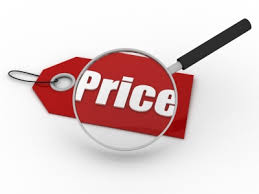Watkins Multi-Channel Strategy
Thoughts on Pricing Concerns
By Watkins Platinum Executive Steve Bretzke
November 8, 2013
Pricing Concerns are Nothing New
 Ever since my wife Ginny and I joined the business in 1990, we've heard team members express concerns that they were being unfairly "undercut" on prices. Ever since my wife Ginny and I joined the business in 1990, we've heard team members express concerns that they were being unfairly "undercut" on prices.
Back then, we heard things like "I saw a Watkins guy at the county fair selling Watkins Vanilla for a dollar less than the catalog price. That's not fair to me. Watkins needs to stop them from doing that."
The answer back then was the same as today: Watkins Corporate sets a "suggested retail price" but Watkins is not allowed to force any seller to sell at a specific price (to do so would be an illegal "price fixing" scheme). So, it's up to each consultant to choose what price they want to sell at. Most sell at the suggested retail price, but others give special discounts at fairs or to friends and relatives. Giving a discount obviously cuts into their profits, but it's perfectly okay for them to make that choice.
For a while now, a limited number of Watkins products have been offered in national chain stores, regional grocers, online retailers, and even smaller shops and boutiques. This was not just by happenstance, but was part of a strategic plan by Watkins Corporate geared at helping consultants and the company overall. The goal has been to get more people familiar with the Watkins brand, and to gain the economic benefits of keeping the Watkins factory running closer to full capacity.
Having Watkins products in stores is nothing new. Products have been available in some stores for virtually all of the company's history. In fact, for decades, Watkins operated their own stores in many small towns across America.
But this newer plan, called a "multi-channel" approach, not only included getting products into stores, but getting publicity through other methods, too. These included promoting the product on television (home shopping networks and shows like "Let's Make a Deal"), putting Watkins products in celebrity gift bags at awards ceremonies, and getting tons of mentions in major magazines including Redbook, Oprah, and more.
Multi-Channel Marketing Is Everywhere
 Virtually every traditional provider of products or services uses a multi-channel approach these days (just think of all the different places you see or hear ads for Geico Insurance, Coca-Cola, McDonald's, etc.). Virtually every traditional provider of products or services uses a multi-channel approach these days (just think of all the different places you see or hear ads for Geico Insurance, Coca-Cola, McDonald's, etc.).
But for a company in the Direct Selling / Network Marketing industry to successfully implement a multi-channel approach has been nothing short of revolutionary.
No other company in our industry has been successful in marrying different distribution channels to compliment the others. Multi-channel marketing solidifies our business like never before. Thank you Watkins for having the vision and courage to pursue success where no one else has succeeded before!
Still, having Watkins products available through multiple channels has led to some pricing concerns, because Watkins can't tell stores what price to sell the products for any more than they can tell us consultants what price to sell at.
The Jergens Hand Lotion Example
 On one hand, it seems logical that consultants might be concerned if they see a Watkins product in a national chain or regional store for less than the catalog price. But let's take a closer look at a competing Jergens product to learn more about ourselves. On one hand, it seems logical that consultants might be concerned if they see a Watkins product in a national chain or regional store for less than the catalog price. But let's take a closer look at a competing Jergens product to learn more about ourselves.
Jergens products have been around since 1882, almost as long as Watkins. The Jergens company was acquired in 1988 by the Japanese personal care company Kao. The overall sales of Kao were estimated at $11 billion in 2011.
Nearly every person on the planet has heard of Jergens hand lotions. You see them on the shelf of every drugstore, discount store and grocery store. You can buy their products on Amazon and countless other online retailers.
I looked into one popular Jergens product, the 21 ounce Original Scent Cherry Almond Moisturizer. I then checked at
a bunch of my local stores to see what the selling price
was. Then I jumped online and searched for what online
retailers were selling it for. Here's what I found:
Brick & Mortar Stores:
$4.97 at Walmart
$6.99 at Schnucks Grocery
$4.99 at Target
$7.29 at Walgreens
$7.86 at Schroeders Drug
|
Online Retailers:
$6.29 at Drugstore.com
$4.97 at Amazon.com
$5.99 at Walgreens.com
$7.09 at Soap.com
$4.97 at Walmart.com
$5.00 at Target.com
|
That's a vast difference in pricing, from $4.97 to $7.86 for the exact same product.
And it brings up obvious questions like:
- "Why does Walgreens or my local drug store or grocery store even bother putting this on the
shelf?"
- "Why do some of these online retailers even bother carrying the product when others are undercutting their price significantly?"
- "How can one store charge 58% more for the same item?"
Part of the answer is this simple fact about stores and
online retailers: Stores and online retailers don't keep things on the shelf or in inventory if they aren't selling and generating a profit.
 Walgreens Doesn't Feel Guilty... and Neither Should You!
Walgreens Doesn't Feel Guilty... and Neither Should You!
Here's an example... Walgreens has rows and rows of products that are more expensive then the same exact items would cost at a discount store. Yet those products remain on their shelves year after year at a high-end price.
How can Walgreens get away with charging so much more???!
It's because Walgreens isn't selling on price alone. They are selling on service, convenience, return policy, the store's reputation, the overall feeling a customer gets when shopping in their store, and a host of other reasons unrelated to price.
Not every customer cares about all those other reasons (it's estimated that about 15% of people shop on price alone). But ENOUGH customers are willing to pay more for a product because of the positive things they enjoy about the Walgreens shopping experience. It's that "extra value" that allows Walgreens to be on the higher end of the pricing spectrum and still make an adequate profit to stay in business.
Now, I don't know about you, but I'm a logical guy who's concerned about my family's budget. Yet I've bought hundreds of items at Walgreens during my life that were available for a significantly lower price at Walmart or some other nearby store.
But guess what.... The sales person at Walgreens has NEVER felt guilty about me paying more at Walgreens. They never told me I could buy a product for 50 cents less at Walmart, or that I could go online and get it for even less.
A customer of Walgreens doesn't feel that they are getting
ripped off when they pay an extra dollar for something that
is cheaper elsewhere. They don't accuse the manager of
fraud. They don't tell the sales clerks they should quit working at Walgreens because they're overcharging people. The customers don't demand that Walgreens match the price, or somehow feel that Walgreens is being unethical.
All the same things apply when our Watkins customers buy from us...
When people are buying products, they simply realize that different stores charge different prices for the same item.
Walgreens understands an important concept, and we Watkins consultants need to understand it, too: We aren't selling on price alone.
And yet, it's not uncommon for me to hear concerns or questions from our team members on the issue of price:
"How can I possibly sell Watkins products for the catalog price and charge shipping and sales tax, when people can find some of the Watkins products in other stores or online for less? Won't people think I'm unethical or ripping them off?"
No, people won't think you're being unethical, just like you don't think the Walgreens clerk is being unethical.
The Walgreens clerk is just selling products to people who feel the price they pay at Walgreens is a decent value for the overall shopping experience. It's the same way with you as a Watkins consultant.
You're simply offering people a chance to enjoy using Watkins products after having a pleasant shopping experience with you. It's YOU that makes their buying experience happy, fun, and informative:
The value that you personally add to the transaction is what makes people decide to keep coming back to you for their Watkins products even if they see some of our products offered elsewhere for less.
Know the Reasons Why People Buy from YOU
Here are several reasons people may buy from you instead of other places they could possibly find Watkins products:
- Some people love the Watkins heritage. They may have heard their grandma talk about the good old days when the Watkins man brought products to the house, and it gives them comfort that YOU will still conduct business face-to-face to let them enjoy the "good old days" in today's crazy world.
- Some people like having a "personal shopper." You can listen to what's important to them, what scents and flavors they like, etc. You can share what your favorite Watkins products are, and share stories from your personal experience or things you've heard on our team conference calls. In short, some people like having a knowledgeable, friendly person to chat with them and consult with them---after all, that's why Watkins calls us all "consultants."
- Some people want one-stop convenience. They'd rather get the full range of Watkins products from you rather than having to mess with grabbing a few at Walmart, a few at Target, and a few at other stores or online.
- Some people don't like shopping at certain stores. They may feel the shopping experience at Walmart is cold and impersonal, or they may dislike what the company represents to them. Perhaps they'd rather shop with you than give more profits to Sam Walton's children.
- Some people just like YOU. They enjoy your smiling face, your positive attitude, and your ability to give them top-notch service. They'd rather buy from someone they know and like.
Those are the kinds of things you should think about when you're interacting with customers. You shouldn't put a spotlight on pricing at all. You are, after all, selling at the "suggested retail price" and there's nothing wrong with that.
There is NO REASON for you ever to be embarrased or feel guilty about selling Watkins products at the suggested price, even if it's possible for some people to find some Watkins products elsewhere for less.
Remember, only about 15 people out of every 100 consistently make purchase decisions on price alone. And, guess what, those people aren't typically going to buy any Watkins product from any consultant, store, or online vendor... the people who shop only on price are going to buy some inferior brand at the dollar store, so they really aren't part of your potential customer base at all.
But still, our team members sometimes "shoot themselves in the foot" on the topic of price. Consultants may try to convince their customers that Watkins products are a better bang-for-the-buck than other natural-based brands. Or they may show customers a "price per use" comparison sheet that may have made sense twenty years ago, but doesn't really apply in the same way today. By doing those kinds of things, you've just taught your customer that price is something they should be concerned about. It doesn't need to be that way...
Instead, when you're presenting Watkins products to people, focus on the high-quality and natural ingredients of our products, but don't use the price as a reason why people should buy from you. Focus on the things that YOU bring to the table that makes their shopping experience with you fun, happy, informative, and pleasant. Give more smiles and have more success!
Final Thoughts
So, back to the Kao company that owns the Jergens brand. They sell BILLIONS of dollars worth of products each year. We are not selling billions of dollars worth of Watkins products yet, but we need to move in that direction. Watkins has personal care products that are made with higher quality natural ingredients. We haven't even scratched the surface on the full potential of the Watkins Personal Care line.
Can Watkins become a multi-billion dollar company like Kao? I don't know, but when every person on the planet has heard of Watkins like they've heard of Jergens, every consultant on our team is going to be sitting on a gold mine of opportunity. Having some of the products offered in multiple channels will help grow the awareness much faster then we could in just the Home Business channel. And when that awareness and demand for our products grows, our overall business logically grows with it.
We're in store for a bright future! Just keep doing the steps that we know lead to success: 1) Use Watkins products daily in your own life; and 2) Share the story about Watkins products and the business opportunity with others.
Note: This is the last article in this series about the Watkins Multi-Channel Strategy. You can go back to the Overview article.
| 